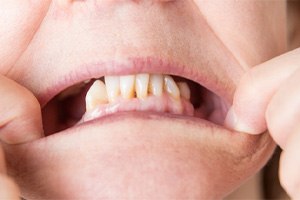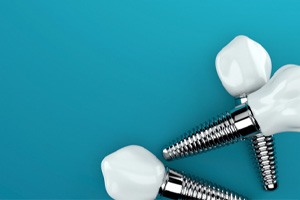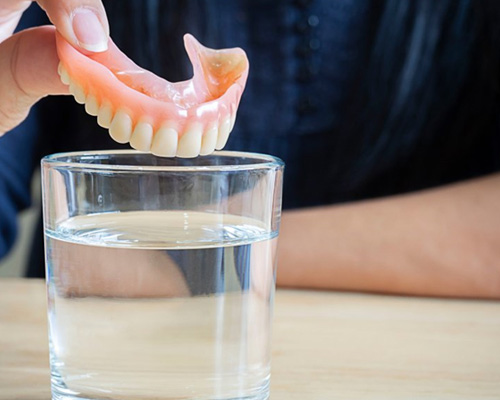Dentures – Bedford, TX
Recomplete Your Smile
Dentures have been around for centuries, but only in the past few decades have they become optimally comfortable, functional, and aesthetically pleasing. Here at Omega Dental, Dr. Gajera and our team are proud to offer multiple types of dentures in Bedford, all of which are designed to help patients enjoy a confident smile and improved chewing ability. If you are interested in exploring your tooth replacement options, get in touch with us today.
Why Choose Omega Dental of Bedford for Dentures?
- Traditional and Implant Dentures Available
- Caring and Empathetic Team
- Top-Quality Materials
Who’s a Good Candidate for Dentures?

Ultimately, almost anyone with tooth loss can qualify for dentures. These prosthetic teeth don’t have strict requirements for use. That said, you should still consult our dentists before pursuing treatment. They’ll confirm whether or not you’re a good dentures candidate. If they decide you aren’t, though, don’t worry; you can qualify later with preliminary dental work. There’s also the option of getting denture alternatives. If you’d like to learn more, just keep reading or call our office today.
Effects of Missing Teeth

Before you consider your denture candidacy, review the causes and effects of tooth loss first. Doing so will help you see how restorations can help.
Overall, many things can cause you to lose teeth. One example is tooth decay, which can erode a pearly white until it falls or needs extraction. Gum disease is another, as it wears down the ligaments that keep teeth in place. It’s also possible to lose a tooth due to physical accidents or injuries.
No matter the reason for your tooth loss, the condition always has severe effects. For starters, it makes everyday tasks – especially eating, speaking, and smiling – harder. Your lack of teeth will lead to nasty-looking smile gaps as well. These spaces aren’t just ugly, either; they even cause adjacent teeth to tilt and fall.
What Qualifies You for Dentures?

As stated before, most patients with tooth loss can get dentures. However, there are other qualifying elements worth looking over.
Your oral health is one such factor. After all, a denture will only work if you have healthy gum and jaw tissue. (Lacking these things deprives the prosthetic teeth of support.) At the same time, your still-existing teeth could make you a good candidate. Dentures are actually suitable replacements for decayed or sensitive chompers.
Something else worth noting is how many teeth you’ve lost. Depending on the number, you’ll need a partial or full denture. A partial kind will only replace a few teeth at most. Meanwhile, a full denture can restore all the pearly whites along the upper or lower arch.
Lastly, you’d do well to look over your budget. Dentures are generally the cheapest oral restorations. As a result, they’re ideal for patients with limited funds.
Alternative Tooth-Replacement Options

If our office decides you aren’t a good dentures candidate, don’t panic. Omega Dental of Bedford offers several other tooth-replacement options. These treatments are the following:
- Dental Bridges – A dental bridge is a fixed restoration made of crowns fused to a pontic (i.e., false tooth). Since it uses your other teeth for support, it can only replace a few pearly whites at a time.
- Dental Implants – Dental implants are titanium posts inserted into the jawbone. Once placed, they act as substitute tooth roots and fuse with your jaw. Given such traits, they require sufficient jawbone density to work. Their high-quality materials can also make them expensive.
Types of Dentures

Every patient’s tooth replacement journey looks a little different. To find out what may be involved in rebuilding your smile, schedule a consultation with your dentist in Bedford. After Dr. Gajera has the chance to examine your mouth, he may recommend one of the following types of dentures:
Partial Dentures

Partial dentures are designed for people who have large gaps between their teeth but whose remaining natural teeth are still in fairly good shape. A partial denture fits in around those existing teeth, sort of like a puzzle piece that goes exactly where it is needed. These prosthetics often consist of an acrylic base with porcelain or acrylic teeth. They have small attachments that help them remain secure in the mouth.
Full Dentures

A full denture replaces an entire arch of lost teeth. They are usually held in place via natural suction, though some patients opt to use an adhesive for extra security. Dr. Gajera carefully designs full dentures so they rest as comfortably as possible on the gums and are stable enough to handle most foods.
Implant Dentures

If you are looking for premium tooth replacement, implant dentures may be your best option. Rather than relying on natural suction, they are anchored in the jawbone via prosthetic tooth roots (dental implants). They are an excellent choice for patients who want their new teeth to be as strong and long-lasting as possible. They even help to preserve the jawbone, preventing the changes to facial shape that are common after tooth loss.
How Dentures are Made

Even if you’re already well aware of what dentures are and the benefits they offer, you may not know as much about how they’re made. What materials will your prosthesis be comprised of? What will the steps of the creation process look like? Familiarizing yourself with the details of how dentures are made can help you find a deeper appreciation for your new teeth.
What are Dentures Made Of?

Dentures have two main components that can be made out of different materials. The base of the denture – the part that supports the artificial teeth – typically consists of acrylic; this is especially the case for full dentures. Acrylic is a good choice because it can match the appearance of your gums. If you’re getting partial dentures, the base can still be made out of acrylic, but it can also come with metal clips that will keep the prosthesis anchored in place.
When it comes to the artificial teeth, resin or porcelain can potentially be used. That said, many dental professionals favor porcelain thanks to its durability as well as how closely it mimics the appearance of natural teeth.
The Denture Creation Process

Every patient’s mouth is different; as such, your dentures will need to be customized to meet your specific needs. The first step is to capture impressions of your gums. This allows us to create a plaster model of your mouth, which we can then send to a trusted laboratory.
After examining the model, lab technicians will begin the creation process by making a wax version of your dentures. Artificial teeth will be carefully inserted into a wax replica of your gums. Once any necessary adjustments have been made, the wax dentures will be sent to our office.
We’ll schedule an appointment with you so that we can make sure that the dentures fit properly. If they do, the wax dentures will be returned to the lab so that the process can continue.
After the dentures are placed in a flask, they will be exposed to hot water so that the wax melts away. The plaster will be used to ensure that the dentures do not lose their shape. Acrylic will be injected into the flask so that it can act as the new base for the dentures.
Once the plaster has been removed, the technicians may need to make a few last-minute adjustments, such as cutting off excess acrylic. Then, once the dentures have been polished, they will be sent back to our dental office. At this point, we’ll be able to set up one last appointment for you so that you can receive your beautiful new teeth!
Adjusting to Your New Dentures

Even though your dentures will be made for your specific mouth, you may experience a little bit of discomfort while wearing them at first. Luckily, if you continue to wear your prosthesis, your mouth will eventually adjust, and the discomfort should go away. To make things easier, we suggest initially sticking to a diet of soft foods that don’t require much chewing.
The Benefits of Dentures

There is a reason dentures have continued to be so popular after all of these years. In fact, there are several! Some of the benefits that patients enjoy with this tried-and-true tooth-replacement solution include:
A Comfortable, Custom Fit

Partial, full, and implant dentures are custom-made for each patient. So, as long as you keep up with relines, your restoration should continue to fit well and comfortably for several years, allowing you to smile, chew, laugh, and speak with confidence every step of the way.
Pleasing Aesthetics

Not only do dentures have a gum-colored base that helps them blend in seamlessly, but the prosthetic teeth are also custom-made to ensure they fit your facial structure and aesthetic desires perfectly. In short, they are designed to look as natural as possible.
Improved Chewing Ability

It’s no secret that tooth loss can significantly restrict your diet. The good news is that you should be able to enjoy most foods with dentures (with a few modifications to your eating techniques, of course). As a result, you can enjoy much more balanced, varied, and satiating meals.
Cost-Effective

Dentures are one of the most affordable forms of tooth replacement upfront. Plus, many dental insurance providers cover a portion of the cost, which makes them even more budget-friendly. Of course, implant dentures are more costly, but they also last significantly longer!
Easy Maintenance

To keep your dentures clean, you only need a few things, including a soft-bristled toothbrush and clean, cool water. The biggest shift will be brushing your teeth and cleaning your restoration after lunch (if you aren’t doing so already, that is). Outside of that, you just need to come to our office every six months!
Clearer Enunciation

Whether you’re missing one tooth or all of your teeth, you know that tooth loss also impacts your ability to communicate clearly with others. The good news is that dentures can help! There will be a slight learning curve at the beginning, but you’ll be talking like normal again before you know it.
Preserves Oral Health

Unfortunately, tooth loss can take a toll on your oral health too. In fact, it’s very common for patients to experience bone loss, dental drift, and several other complications. Fortunately, dentures can help prevent that from happening, preserving the health of your smile in the process.
Understanding the Cost of Dentures

The cost of dentures will vary a lot from person to person, simply because everyone has a unique smile and different needs. During your initial consultation, it will be determined exactly how much you can expect to pay for your brand-new restoration. Until then, here are some of the things that will affect the cost of your dentures in Bedford and some other things to keep in mind.
Factors that Affect the Cost of Dentures

There are a few different factors that contribute to the cost of dentures. Here are some of the most prominent:
- The preparation before the denture can be worn, like if you need to have a tooth extracted or gum disease therapy.
- The types of materials that are used for both the base and replacement teeth. The base is usually made from acrylic while the replacement teeth can be crafted from acrylic or porcelain.
- The number of teeth that you are looking to have replaced.
Remember that just because something is cheaper doesn’t mean that it’s better, especially when it comes to dental restorations. Budget dentures are more likely to become damaged and require frequent repairs and replacements. If you are looking for optimal comfort and function, quality matters!
Are Implant Dentures More Expensive?

Yes, implant dentures do cost more than traditional dentures, but the is a good reason for it. Instead of being supported by the shape and suction of your gums, implant dentures are held in place by a series of dental implants that are placed in the jawbone. This allows for more benefits, like feeling more lifelike and having additional stability. You won’t need to worry about replacing them every 5 to 7 years like you would with traditional dentures because implants are intended to last much longer.
Does Dental Insurance Cover Dentures?

Most dental insurance plans provide some level of coverage when it comes to your dentures. Many of them provide up to 50%, but this varies depending on your plan. Our practice is in-network with numerous popular dental insurance providers, but we welcome out-of-network of network providers as well. Talk to our team so we can help you fully maximize your benefits!
Other Options for Making Dentures Affordable

If you don’t currently have dental insurance, this doesn’t mean that you are completely out of luck. For instance, we can help you to break up the cost of your treatment into reasonable monthly payments through CareCredit. Together we can come up with a plan that is ideal for your smile and your budget!
To learn more about the cost of dentures in Bedford, schedule a consultation with us. We’re eager to help you get your smile back!
Dentures Aftercare

Your new set of dentures will be durable and aesthetically pleasing, but without proper cleaning and maintenance, they can become dull and pose risks to your oral health. If you’d rather avoid frequent replacements and possible complications, follow these care tips. With a little extra appreciation, your dentures will be ready to stand the test of time and fill out your smile!
Removable Dentures
Remove After Eating
After every meal, you should remove and rinse your dentures. Doing so will mitigate bacteria build up, protecting your gums and other tissue from oral health problems.
When you rinse, though, be sure to use lukewarm water. Hot temperatures can warp the material in your dentures, literally bending them out of shape.
Clean Your Restoration
At the end of the day, take your dentures out for a thorough cleaning. Brush them gently with a soft-bristled toothbrush and either hand soap or dish soap. Don’t forget to brush the underside!
Once you’ve scrubbed bacteria and food debris from your dentures, you can let them soak in a special denture cleaning solution overnight. This helps sanitize your dentures, allows you to quickly rinse and insert them in the morning, and gives your gums a much-deserved break while you sleep.
Keep Your Dentures Safe
Dentures are pretty hardy, but they’re not invincible! To keep them safe, drape a soft towel over your sink while you clean them. If you accidentally drop them, the towel will make for a much smoother landing than a porcelain countertop.
We also recommend storing them in a secure, perhaps high, location when not in use. This will help keep them safe from curious children and adventurous pets.
Remove When You Sleep
Even if you don’t use a denture-soaking cleaning solution, you should still remove your dentures at night! We mentioned that this gives your gums a much-deserved break, but a break from what?
During the day, your gums do the heavy lifting of supporting your dentures. Your prosthetic is meant to fit snuggly, and they restrict blood flow to your gums when worn. Gums and other organic tissue need circulation to stay healthy, which means removing your dentures before you get too cozy underneath your blankets.
Notice Changes
If your dentures don’t fit as well as they used to or get damaged, give us a call and let us know. With our professional tools, we can safely adjust or repair your dentures.
You should also keep an eye out for sores, irritated gums, signs of infection – such as a pimple-like bump on your gums – or other abnormalities. These types of things could indicate something’s not quite right, and we can take a look and provide prompt treatment.
All-on-4 Dentures
Since all-on-4 dentures have dental implants, caring for them looks a bit different. Here’s what we recommend:
- Brush your dentures twice daily with a soft-bristled toothbrush and reach underneath your prosthetic with a sulcus brush to clean your gums.
- Floss once daily with your preferred method – traditional floss, threaders, or a water flosser.
- Rinse your mouth daily with an antibacterial mouthwash to mitigate tartar growth.
Dentures FAQs

Dentures are a lifechanging tooth replacement option for people who are missing several, most of, or all of their teeth. However, you may still have some answered questions. Here are the answers to some of the most common inquiries we receive about dentures in Bedford. If you don’t see the information that you’re looking for listed below, don’t worry! Give us a call and we’d be happy to answer your questions and schedule you for your initial consultation.
Should I Have All My Teeth Pulled to Get Dentures?
Repairing a damaged tooth when possible is always a more ideal option than replacing it. Tooth extractions of any kind will only ever be recommended if it is absolutely necessary, like when a tooth is severely damaged by decay, and infection, or trauma that has broken off a large portion of enamel. If all the teeth an in arch are decayed or infected with gum disease, this may be the best idea, but all of your options will be explored by your dentist before extractions are recommended.
Can I Sleep with My Dentures?
Dentists generally recommend that you take your dentures out when you go to bed. When you first get your dentures, you’ll most likely be told to keep them in your mouth for 24 hours, including when you sleep, but after this, you should be removing them every evening. Wearing dentures restricts the circulation in your gums and can lead to soft tissue irritation and speed up ridge resorption. When you take out your dentures, this gives the gums a chance to recover and get the nutrients they need while you catch some Z’s. The dark, moist space beneath the dentures is also an ideal place for bacteria to thrive, so they have been found to be associated with a higher risk of pneumonia. Ultimately, it is a good idea to give your gums a break at night.
Will It Hurt to Get Dentures?
If you need to have teeth extracted before you get dentures, you may experience some discomfort after the oral surgery. Luckily, this can be managed with over-the-counter and prescribed pain relievers. When you first get your new dentures, there will be an adjustment period where you may experience some minor irritation. If you switch to a new set of dentures, this process may take longer than before. If pain persists, give us a call so this can be addressed.
Can You Still Eat Steak with Dentures?
Tough meats, like steak, can be difficult to chew when you have dentures, but it is still possible if you take the right precautions. Select tenderloin and other beef cuts that don’t contain as many connective tissues or muscle fibers. Make sure that the meat is thoroughly tenderized beforehand. Cut the steak into small, manageable pieces to make them easier to chew.

